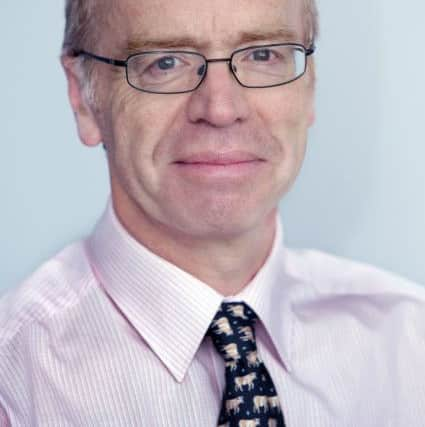'˜We're vilified for not hitting diabetes targets, but patients must take more responsibility' says Leighton Buzzard GP


Dr Chris Marshall, of Salisbury House Surgery, says 50 per cent of healthcare is nothing to do with private care.
“It’s to do with the social environments and the lifestyles around that,” he told Central Bedfordshire Council’s health and wellbeing board.


Advertisement
Advertisement
“It’s not walking to school, it’s getting in the car to go to school,” he said. “It’s not having proper architecture for houses, footpaths and cycleways.
“I feel ashamed we (GPs) haven’t hit all our targets and I will accept that. But really it’s the person’s illness.
“If you want 15 years of ill health go ahead and have it, but you have been told what to do. I find it a little bit disconcerting.
“I’m fairly ashamed as a practitioner that we can’t make the changes we advocate and recommend to do.”
Advertisement
Advertisement
He told a board meeting last week he had “50 bits of pathology to look at this morning” and nearly all were patients with diabetes.
“One was told to go out and lose some weight,” he explained. “He had gone out there this year and lost 5kg in weight. He’s now normal. In that case it’s a job done. He’s a success. It looks good.
“Another person was diagnosed with diabetes and weighing as 100kg about ten years ago.
“Last blood test, because I was marking it today, weighed 109kg. This patient has been told twice a year what she should do.
Advertisement
Advertisement
“This person is refusing treatment,” he added. “Yet we as GPs get vilified for not hitting the diabetes targets.
“This illness really has got to be put back into the patient’s court.”
A report to the board by Bedfordshire Clinical Commissioning Group’s diabetes clinical lead, Dr Sanhita Chakrabati, focused on improving outcomes for diabetes patients.
“People have enrolled into the diabetes prevention programme,” she said. “It’s so people who are diabetic can look after themselves better.
Advertisement
Advertisement
“It’s significantly helped in the reduction of amputations. We are working collaboratively with Luton and Dunstable Hospital and Bedford Hospital.
“It will take a while for a substantial change in the overall figures.
“There is positive feedback from patients. It’s a new way of care helping them take more responsibility for the improvement of their care.”
Conservative Dunstable Central councillor Carole Hegley asked: “Is there a direct correlation between excess weight and diabetes?
Advertisement
Advertisement
“Are you telling me that every person who is diabetic is overweight?
“Is there something else in the dynamics that leads to diabetes whether or not it might be poor diet, not necessarily excess weight?
“What else can we do to upstream get people to avoid it? Unless I am ill I won’t come and see you (GPs).
“Who else is going to tell me to stop doing what I am doing because I am an example of excess weight?
Advertisement
Advertisement
“I have a mental health problem because I keep eating eat food,” she said. “I don’t know what I’ve got, but I’m just challenging the system.
“Who gives that advice when you aren’t going to the doctors because you aren’t unwell, but you could be heading for a problem? So it’s that early step.”
Dr Marshall replied: “There’s quite a lot of evidence to suggest people who are overweight are much more likely to get diabetes.
“People who had bariatric surgery and who had diabetes 85 per cent did not have diabetes afterwards because they couldn’t eat.
Advertisement
Advertisement
“That will have a tremendous impact on lessening the burdens for the whole health care economy.
“It’s just vast, from amputations, increased heart rate issues to increased cancer risk with diabetes and with people who are overweight.
“It’s certainly a massive risk factor,” he said. “If you get rid of overweight in the whole of society you do not have diabetes.
“We’re only a few generations away from hunter-gatherers. It was feast or famine. So they would eat and store something.
Advertisement
Advertisement
“It’s just that people don’t move enough and they eat too much. That’s the cause of diabetes. I have written papers and articles about it.
“But if you want to make your life healthy for the future do not put weight on. Do go out and do some exercise.
“Weight and inactivity are paramount things that should be avoided,” he added.
“Another point of interest, we do eat less today than in the sixties. Our calory intake is less.
Advertisement
Advertisement
“It’s not the overeating that has caused this difficulty. It’s the other things around our society.
“In the sixties people were walking to the station, walking to get a bus and walking to school.
“We’re eating less than we did in the early sixties, but the diabetes problem has become much worse.
“Eating is not the whole issue. It’s the things around it in society.”
Advertisement
Advertisement
BCCG’s director of public health Muriel Scott said: “People don’t choose to be obese or to have diabetes.
“It’s how we can work and support people to be healthy, and it takes us back to the health and wellbeing strategy we have just signed off.
“Put the right support in for people so they are able to make healthy choices. People don’t choose to be unhealthy.”
CBC’s chief executive Richard Carr said: “I am thinking about system wide interventions we need to make, as we previously said over excess weight.
Advertisement
Advertisement
“If we make headway with that we’ll forestall some of the issues later.
“It’s challenging us all to put ourselves in the shoes of the people on the receiving end of the advice and work through with them what are the practical solutions that take account of their individual circumstances.
“We constantly need to drive this focus on what’s happening in our area.
“We need to engage with patients and residents where they are in their life. And that’s a real challenge I know.”
Advertisement
Advertisement
Conservative Leighton Buzzard North councillor Brian Spurr, who’s the executive member for health and chairs the board, said: “I would like them both (excess weight and diabetes) to come back to us.
“It’s not appropriate that we carry out work that’s not giving us acceptable outcomes.”